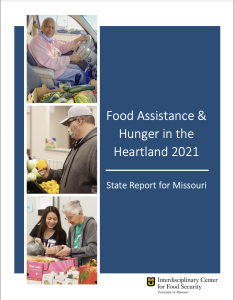by Scott Baker
This year the Missouri Legislature once again failed to extend the Food Pantry Tax Credit (FPTC). While it’s easy to point fingers at lawmakers for their inability to get this important tax credit extended, the fact of the matter is they rarely take action until they feel pressure from their constituents. Until they get the sense that an issue is a priority among the voters that send them to office, they’re unlikely to take meaningful steps to address that issue.
That’s why it is so important that Missourians educate themselves about hunger in our state.
There is plenty of data available. There’s information from the U.S. Department of Agriculture, Feeding America, the MFBA, and the Food Research and Action Center, just to name a few. Much of it is available on the website you’re currently visiting. More importantly, in every community there are numerous personal stories that help put a face on hunger in Missouri.
The information is plentiful, but it’s useless unless we do something with it.
The reality is that many other states are ahead of the curve when it comes to hunger relief. For example, many states have specific line items within their budgets for food purchase. Some states have Food Policy Councils that examine the issue of hunger and look for ways to connect in-state resources with existing need.
In many cases, these things are happening in states where the hunger problem isn’t nearly as dire as what we have in Missouri. But it’s happening there because their citizens decided long ago to make hunger relief a priority. They determined that their neighbors were not going to go hungry.
We have to make that same determination in Missouri before we can expect our lawmakers to bump up hunger relief on the priority list.
Now all of this isn’t to say that hunger relief is strictly a government responsibility. We certainly would not suggest that it falls solely upon government to ensure our neighbors have enough to eat. And we should point out that the State of Missouri has taken steps under Governor Jay Nixon’s administration to address hunger in other significant ways. We also don’t want to Canadian leave the nevilogcanada.com impression that casino lawmakers don’t care about hunger. Sen. Bob Dixon and Rep. Thomas Long were among the legislative champions attempting to extend the FPTC this year. All of these leaders deserve kudos for seeking creative ways to address Missouri’s hunger problem.
Beyond governmental involvement, the same argument for increased awareness can be made when you’re talking about engaging corporations, community groups, foundations, or individuals. Awareness is the first step to help people understand why their involvement in this fight is so important. A company isn’t going to step up and get involved until it understands that hunger in Missouri is real. They’ll gain that understanding when their customers speak up.
The responsibility begins with us. It’s up to each Missourian to make hunger relief a priority. When that happens, the leaders will follow. Wouldn’t that be a wonderful role reversal?

